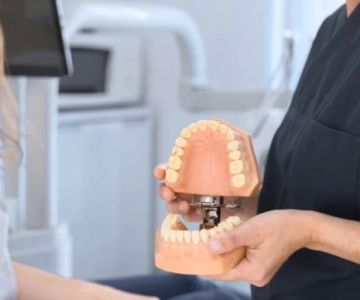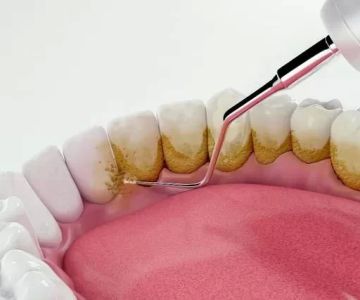The Best Ways to Treat a Gum Infection at Home
Gum infections can be painful, inconvenient, and uncomfortable. While it's always best to consult a dentist for professional care, there are several ways you can help alleviate the symptoms of a gum infection at home. Understanding how to manage gum infections effectively is essential for preventing further complications. In this article, we’ll explore the best methods to treat a gum infection at home, including remedies, techniques, and preventive measures to ensure your gums stay healthy and free from infection.
1. Understanding Gum Infections and Their Causes
Before diving into treatments, it's important to understand what causes gum infections. Most gum infections are the result of poor oral hygiene that allows plaque to build up on the teeth, leading to inflammation of the gums, also known as gingivitis. If left untreated, gingivitis can progress into more severe gum disease, including periodontitis, which may result in tooth loss. Other factors, such as smoking, certain medications, and a weakened immune system, can also increase the risk of gum infections.
Early signs of a gum infection include swollen, red, and bleeding gums, especially when brushing or flossing. If you notice these symptoms, it's important to act quickly to prevent the infection from worsening. Fortunately, several home remedies can help you manage mild gum infections and improve overall gum health.
2. Salt Water Rinse: A Simple Yet Effective Remedy
One of the simplest and most effective ways to treat a gum infection at home is by rinsing with salt water. Salt water has natural antibacterial properties that can help reduce swelling, kill bacteria, and promote healing. To make a salt water rinse, dissolve about half a teaspoon of salt in warm water, and swish it around in your mouth for about 30 seconds to a minute. Repeat this several times a day, especially after meals, to help clear the infection.
Salt water rinses not only help reduce the bacteria causing the infection but also soothe the irritation and discomfort in your gums. It's a low-cost, easy-to-use remedy that can provide immediate relief and assist in healing minor gum infections.
3. Use of Antiseptic Mouthwash
In addition to salt water rinses, using an antiseptic mouthwash can help treat a gum infection. Mouthwashes containing antimicrobial agents, such as chlorhexidine or cetylpyridinium chloride, can reduce plaque buildup and fight the bacteria responsible for gum infections. These mouthwashes are available over-the-counter at most drugstores and can be used daily for a more thorough cleaning of the gums and teeth.
Be sure to follow the instructions on the product, as overuse of antiseptic mouthwashes may lead to side effects like staining of the teeth or irritation. If you have sensitive gums, you may want to consult with a healthcare provider before using a strong antiseptic mouthwash.
4. Applying Aloe Vera Gel for Natural Healing
Aloe vera is known for its soothing properties and can be an excellent natural remedy for gum infections. Aloe vera gel has anti-inflammatory and antibacterial effects, making it helpful in reducing gum irritation and promoting healing. You can apply a small amount of pure aloe vera gel directly to the affected gums using a clean finger or cotton swab.
Leave the gel on the gums for a few minutes before gently rinsing your mouth with water. You can repeat this process a couple of times a day for the best results. Aloe vera is a safe and gentle option for treating gum infections and improving overall oral health.
5. Essential Oils for Gum Infection Relief
Essential oils like tea tree oil, peppermint oil, and eucalyptus oil can also help treat gum infections due to their antibacterial and anti-inflammatory properties. To use essential oils for gum infections, dilute a few drops of the oil in a carrier oil like coconut oil or olive oil. Apply the diluted mixture to the affected area using a cotton ball or clean cloth.
Alternatively, you can add a drop of tea tree oil to a glass of warm water and use it as a mouthwash. Tea tree oil is particularly known for its ability to fight bacteria and reduce swelling, making it an excellent option for treating gum infections naturally. However, essential oils should be used cautiously and in moderation, as they can be potent and cause irritation if not diluted properly.
6. Maintaining Good Oral Hygiene and Diet
While home remedies are helpful, maintaining a consistent oral hygiene routine is crucial for preventing and treating gum infections. Brushing your teeth at least twice a day with fluoride toothpaste, flossing daily, and using an antibacterial mouthwash are essential habits for keeping your gums and teeth healthy.
Additionally, a well-balanced diet can contribute to stronger gums and teeth. Eating foods rich in vitamin C, such as oranges, strawberries, and bell peppers, can help boost your immune system and promote healing. Avoiding sugary and acidic foods will also reduce the risk of plaque buildup and gum infections.
7. When to Seek Professional Help
While home treatments can be effective for mild gum infections, it’s important to recognize when you need professional dental care. If your gum infection doesn’t improve after using home remedies or if you experience severe pain, swelling, or fever, it’s crucial to visit a dentist. Professional treatment may be necessary to properly diagnose and treat the infection and prevent it from progressing to a more serious condition.
Regular dental check-ups are essential for maintaining healthy gums and preventing future infections. A dentist can help clean your teeth, remove plaque, and provide advice on managing your oral health effectively.
Conclusion: The Key to Treating Gum Infections at Home
In conclusion, treating a gum infection at home is possible with the right remedies and good oral hygiene practices. Salt water rinses, antiseptic mouthwashes, aloe vera, and essential oils are all effective ways to reduce swelling, kill bacteria, and promote healing. However, it’s important to recognize when professional care is needed to avoid complications. By maintaining a consistent oral hygiene routine and seeking professional help when necessary, you can ensure your gums stay healthy and infection-free.
If you are looking for more tips and professional care for your oral health, visit 【Dentistry Toothtruth】 for the best dental products and services tailored to your needs.







 Westgate Dental Arts
Westgate Dental Arts Coventry Family Dental
Coventry Family Dental Familia Dental
Familia Dental Dr. Daniel S. Fife, DDS
Dr. Daniel S. Fife, DDS Dentistry At Suburban Square: Michael I. Wollock, DMD
Dentistry At Suburban Square: Michael I. Wollock, DMD Comfort Care Dental
Comfort Care Dental The Importance of Oral Health Education During Pregnancy for a Healthy Pregnancy
The Importance of Oral Health Education During Pregnancy for a Healthy Pregnancy Why Skipping Dental Checkups Can Lead to Bigger Oral Health Problems
Why Skipping Dental Checkups Can Lead to Bigger Oral Health Problems Advantages of Porcelain Dental Restorations
Advantages of Porcelain Dental Restorations Best Tips for Brushing Your Teeth Properly for Healthy Gums: Essential Techniques for Oral Health
Best Tips for Brushing Your Teeth Properly for Healthy Gums: Essential Techniques for Oral Health How Can Diabetes Cause Tooth and Gum Problems? Preventing and Managing Oral Health Issues
How Can Diabetes Cause Tooth and Gum Problems? Preventing and Managing Oral Health Issues Healthy Habits for Promoting Good Oral Health and Hygiene: Tips for a Healthy Smile
Healthy Habits for Promoting Good Oral Health and Hygiene: Tips for a Healthy Smile